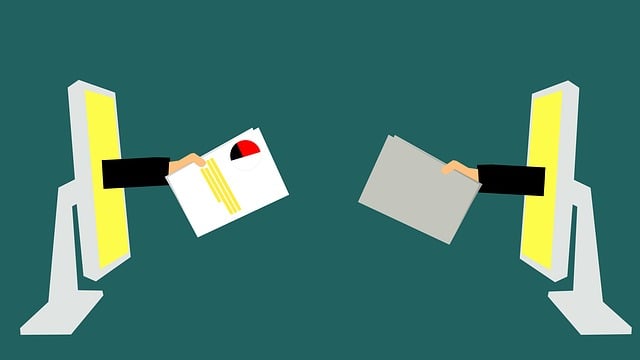
Audit activities serve as a way to maintain proper checks and balances within governments. But this system can also be applied to businesses and other kinds of organizations. When audits are conducted on privately-held companies or non-government organizations, a certain level of secrecy is required between the parties to the contract to ensure that sensitive business and personal information is not divulged accidentally or deliberately. In these cases, an audit confidentiality agreement is created. You may also see confidentiality templates.

In this article, we will discuss the relevance of using this kind of agreements when conducting personal and business audits. We will also provide tips on how to make sure that the audit confidentiality agreement you are signing is the best and most beneficial version of a legally binding contract you could have. You can also like meeting confidentiality agreements.
 agreement template bundle 788x510" width="390" height="252" />
agreement template bundle 788x510" width="390" height="252" />
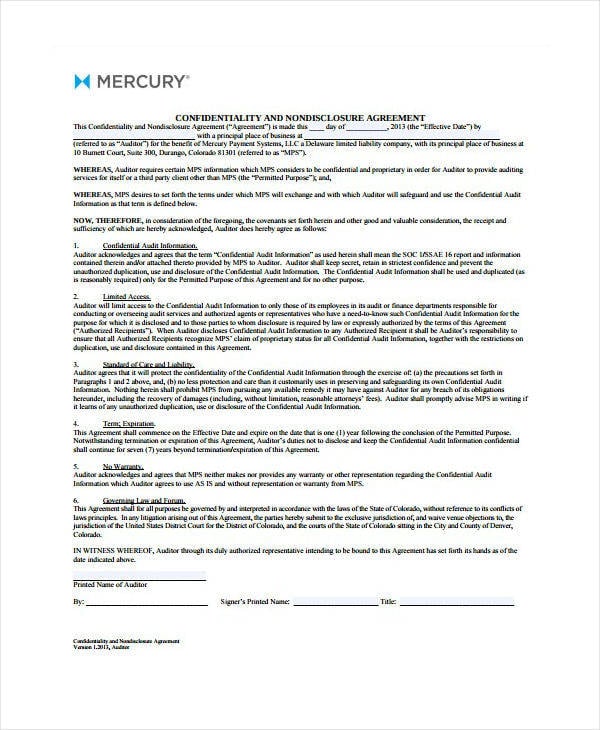
filestore.scouting.org
File Format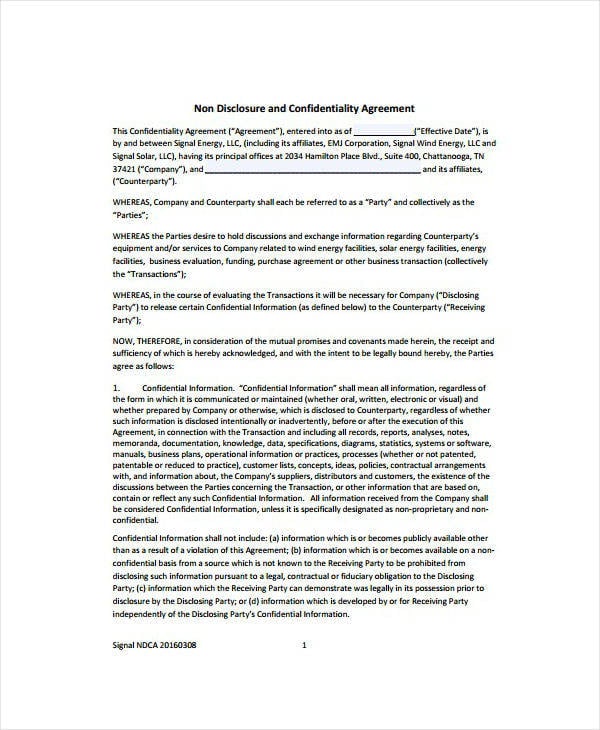
signalenergy.com
File FormatEmbedded below are sample audit confidentiality agreement templates that real-world companies and organizations utilize to maintain their own and their customers’ data privacy. Most of these printable templates are available in PDF template formats so make sure that you have Adobe Acrobat Reader or a compatible software program installed on your computer to view the template properly.
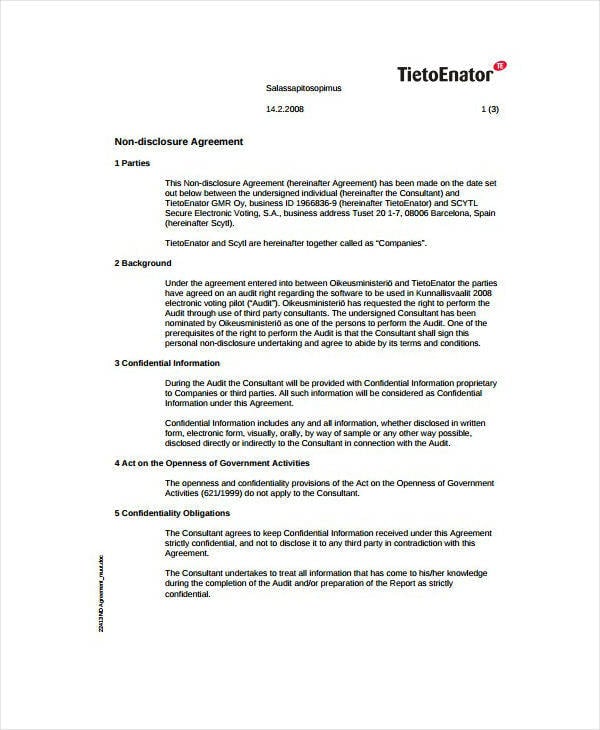
effi.org
File FormatTo accurately define this term, let us first break down the definition of each word in the phrase.
First, what is an audit? An audit is a formal review or investigation of the processes, policies, and/or proceedings governing a person’s, company’, or organization’s operations. The main goal of an audit is to look at the things it is tasked with evaluating and then provide a plan of action for any flagged issues. Most of the time, audits are just part of the regular check and balance activity needed for any organization to function well.
Examples of audit activities are financial audits, data audits, and system audits.
A confidentiality agreement, on one hand, is a legal and binding document between two or more parties to maintain the secrecy or privacy of the information utilized during the conduct of a certain process or proceeding. In this kind of agreement, the agreeing parties are required by law to prevent the use of shared data by third parties without the specific consent of the primary data provider. Confidentiality agreements are also someones called non-disclosure agreements or NDAs.
When an agreement is specifically called an audit confidentiality agreement, it is meant to bind the auditors to a cloud of secrecy. With this kind of agreement in place, an auditor or a group of auditors are prohibited to disclose any company or personal information that was used, processed, or evaluated during the entirety of the audit activity. You may also see basic confidentiality agreement.
As with all kinds of legal agreements, it is best that they are written by a licensed attorney to avoid loopholes and inconsistencies with local and state laws. All the different agreement template examples that we have included in this article may be used as a base for your final audit confidentiality agreement. It is better to read and review them so that you may find the best provisions and stipulations that can be added to your own legal confidentiality agreement.
On a side note, you can always explore the rest of our website for more tips and agreement template examples.
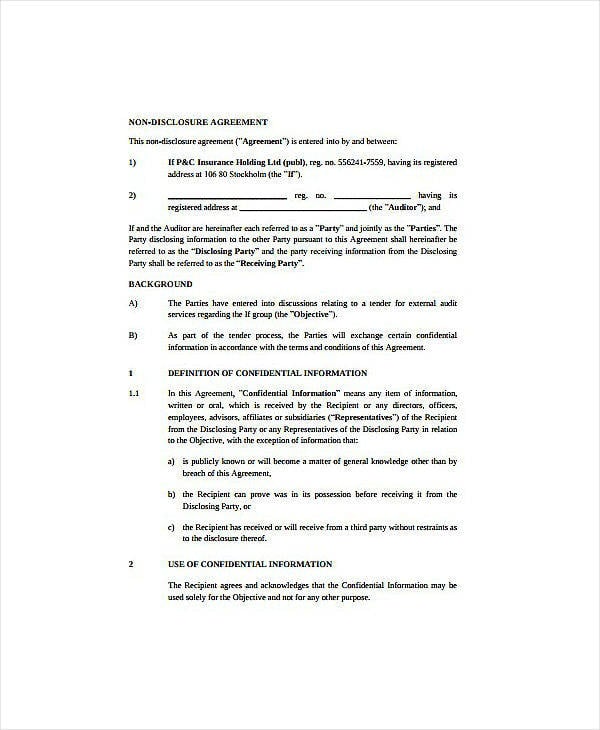
if.fi
File Format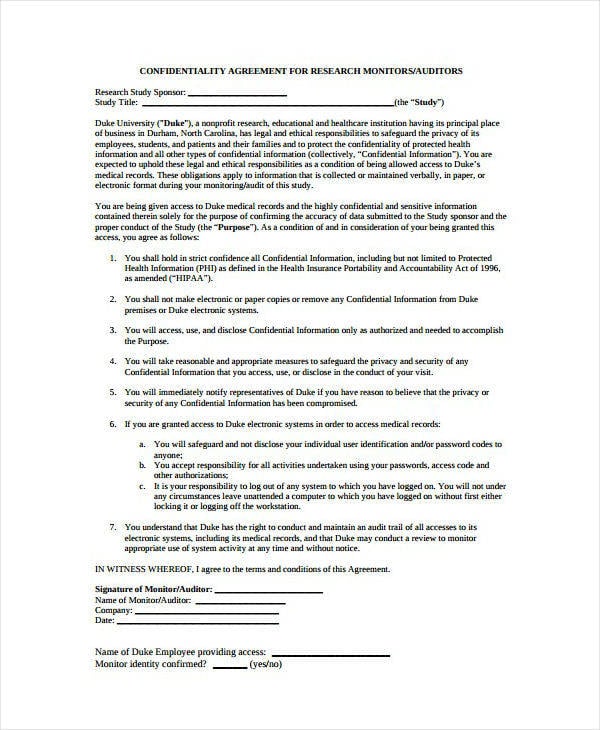
medschool.duke.edu
File Format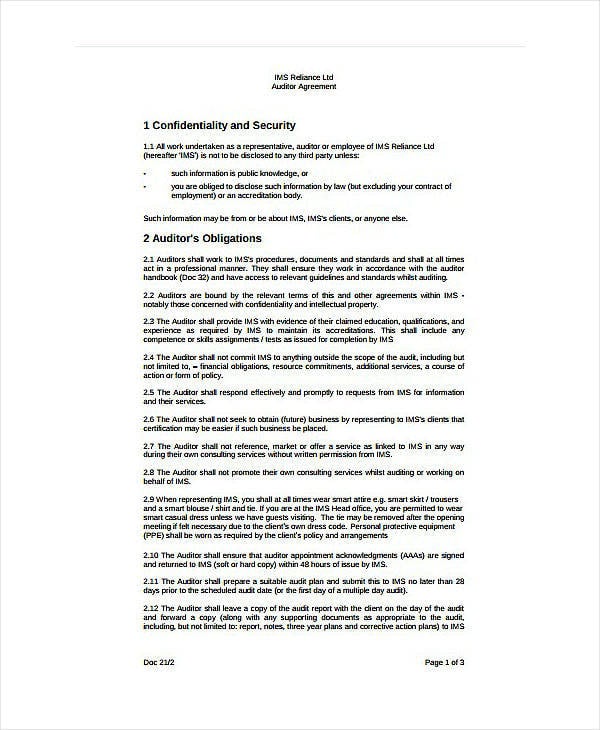
imsworld.org
File FormatDrafting and/or signing an audit confidentiality agreement should not be taken lightly. Afer all, offenses committed to the terms of this kind of legal contract can be grounds for costly and business-affecting consequences. That is why it is best to make sure that you have the best and most updated audit confidentiality agreement before an audit or other kind of business transaction is set into motion.
In the next few paragraphs, we have listed down the top things that anyone (entrepreneurs, managers, private individuals, etc) should look into before their respective lawyers finalize their audit confidentiality agreements. You may also see sample legal confidentiality agreements.
If a confidentiality agreement is created ensure that the information processed during an audit activity is kept in secret, you should make sure that the wording of the written agreement specifically states all the pieces of information or data that are covered by the agreement. This is a very important thing to include in any kind of confidentiality agreement because this is the basis for why the agreement is needed in the first place.
To illustrate, if your business needs to undergo an external financial audit, your auditors need to sign a confidentiality agreement that limits to what they can do with sensitive financial information about your business. A good audit confidentiality agreement should also include verbiage that limits unnecessary duplication, disclosure, and use of the promisee’s business information.
Whether you are in the process of drafting or reviewing an audit confidentiality agreement, you should also check if the agreement includes specific verbiage on who can and how will your business or personal details be accessed during or after the course of the audit. You may also see sample volunteer confidentiality agreements.
For example, most governments require businesses to conduct both internal and external audits. This then prompts businesses to hire third-party auditing firms to evaluate their finances or whatever aspect of their business or organization that needs to be audited. In the event that an auditing firm performs the audit, the audit confidentiality agreement should specifically state that the information processed on the audit should only be accessible to a few key people on the auditing team. Doing this will limit the chances that your personal and business information be used for unauthorized purposes. You can also like personal confidentiality agreements.
Another integral component of any kind of confidentiality agreement is a section on Standard of Care and Liability. This refers to the commitment of the auditor to ensure and enforce the total protection of the client’s personal and/or business information as indicated by the terms of the agreement. This also means that any breach to the agreement (like unauthorized duplication and use of business information) may result in the promisee from pursuing any legal remedy. You may also see sample real estate confidentiality agreements.
If you are requesting for an audit report from an auditing company, you should look for this portion on the confidentiality agreement to ensure that the auditor/s will be held liable for any issues that arise due to their negligence and incompetence.
All standard agreements should have an end or completion date especially if it is created as a part of a bigger legal contract or transaction. For instance, in the case of a business internal audit, there will most likely be a separate contract between the company and the auditing firm for the performance of a financial audit. The audit confidentiality agreement is added to the mix to ensure that the information processed during the audit is not disclosed to other parties.
In cases like this, the actual auditing contract may end within a few months or years while the standard non-disclosure and confidentiality part of the audit process may take a few more years to end.
As a business owner or an auditor, you should make sure that the audit confidentiality agreement you are signing includes this specific verbiage. By doing so, you will know the end date of the contract and you will no longer be held liable for any accidental or deliberate disclosure of the confidential audit information. You may also see sample generic confidentiality agreements.
It is mandatory for standard confidentiality agreements to include a section on the governing law and forum where the agreement is covered. This means that the confidentiality agreement should specify the country, state, or district that has legal jurisdiction over the contracting parties and the agreement. Including this in a written business agreement will help make sure that it is legal and binding. Any litigation that may arise out of a breach to the confidentiality agreement can then be easily processed since the agreement has already specified it.
So those are most important components that anyone creating or about to sign an audit confidentiality agreement should look into before affixing one’s signature into. Of course, other practical tips like making sure that the names, witness signatures, and attorney’s signatures are present on the agreement should also still apply. We have just highlighted these important components since they are the core elements that will be reviewed when issues arise from violations to the agreement. We hope that you have learned a lot from this article. You may also like creating a confidentiality agreement.
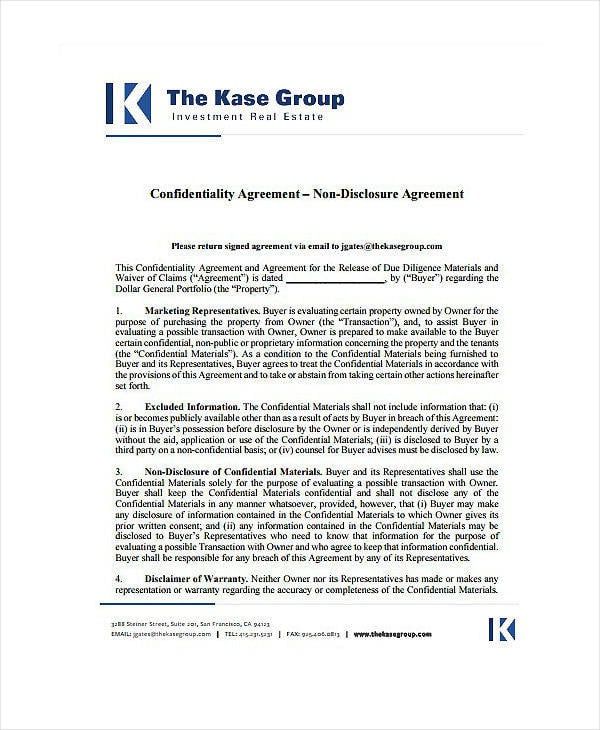
thekasegroup.com